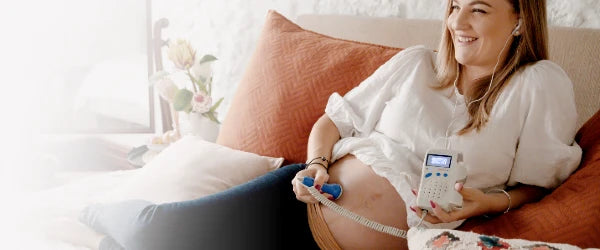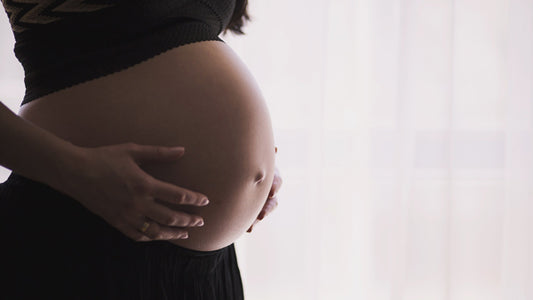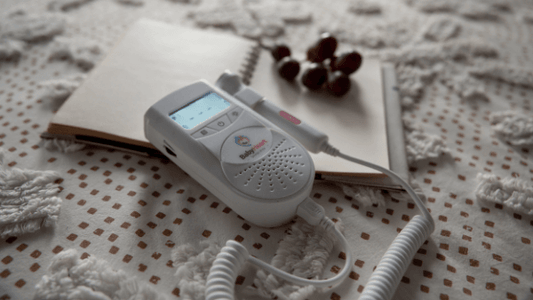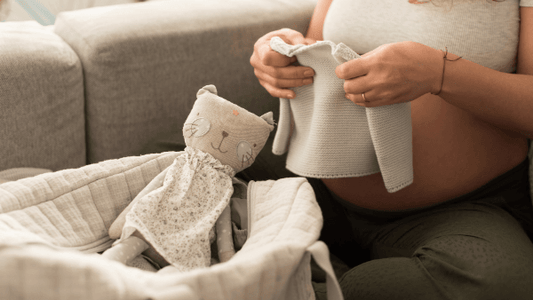
The biggest question people have about fetal dopplers is, "Is it safe to use a fetal doppler at home?"
The short answer is, fetal dopplers are intended for at-home use to connect with your baby by listening to their heartbeat. An at-home doppler is a great way to bond with your baby in the comfort of your own home by listening to their heartbeat.
Please note that BabyHeart dopplers are for sharing special moments and bonding, not for checking your baby's health. They are not medical devices. They cannot provide peace of mind or reassurance and must not be used for this purpose, as they are not designed for this. Always consult a healthcare professional for any medical concerns.
Below we'll expand on common questions everyone has about fetal-dopplers.
1. Is it Safe to Use a Fetal Doppler at home?
Fetal dopplers are intended for at-home use to help you connect with your baby.
A fetal doppler uses soundwaves to listen to the fetal heartbeat. These soundwaves won't harm you or the baby. The main point is that an at-home fetal-doppler should not be used instead of a doctor's appointment. It's a tool to connect with your baby and share a bonding experience with your baby.
The difference between a fetal doppler at home and a fetal doppler at the doctor’s office is who is operating the machine. A doctor or midwife is trained to use a fetal doppler.
They have knowledge and experience in deciphering the sounds and movements. They know what is and isn't concerning. You can’t replace this expertise, but you can still listen to your baby’s heartbeat at home.
2. How Often Is It Safe to Use a Fetal Doppler?
You can use an at-home fetal doppler one to two times per week for a few minutes.
Using the doppler one to two times a week ensures non-harmful usage while still allowing for bonding experiences with your baby. There isn’t medical research to suggest that ultrasounds are harmful when used this way.
If you suspect something is wrong with your baby, you can’t rely on a fetal doppler to tell you if the baby is well. See a doctor immediately, as it’s best to err on the side of caution. Babies can have issues and still have a strong heartbeat, so don’t risk it and talk to your doctor or midwife.
3. Why Can't I Find My Baby's Heartbeat With a Doppler?
It’s normal to have a little trouble finding the baby’s heartbeat sometimes.
Babies move into different positions. Having an empty bladder or rumbling stomach can make it trickier, and having too much gel or not enough can all affect results. There are so many factors at play.
Be sure to use the device from week 12 onwards; before this, you may have trouble hearing your baby’s heartbeat. The timeframe for hearing the heartbeat at home does differ per person and per pregnancy.
If you feel like something is wrong, speak to your doctor or midwife immediately.
4. How to Use an At Home Fetal Doppler
Be sure to read the instructions that come with your fetal doppler thoroughly. You will also need to make sure that your doppler is fully charged.
Using a fetal doppler is easy and convenient. You can use it by yourself, or with your partner. A couple of tips to consider before getting started include:
- The baby’s heartbeat will be easier to hear in the morning when your belly is less bloated.
- Using the fetal doppler while you have a full bladder will also make it easier to hear.
Here is a set of general guidelines to follow when using a fetal doppler at home:
- To use your fetal doppler, lie down on your back on a flat surface and expose your abdomen.
- Apply the gel to your lower belly, ensuring that you use a liberal amount.
- Apply the gel to the fetal doppler probe as well and turn the device on.
- Starting at your pubic bone, glide the probe upwards toward your belly button. Move the probe across your belly slowly making sure to touch every part until you find your baby.
- Listen for a pulsing heartbeat sound. Your baby will usually have a higher heart rate than you.
- You might hear two heartbeats in your fetal doppler.
- The faster one is probably your baby's. A fetal heartbeat is usually higher than an adult's.
- Once you are completed with the session, turn off the device and thoroughly clean the probe.
5. How Does a Fetal Doppler Work?
When you hold a fetal doppler to your stomach, it returns a sound that indicates the heartbeat from your baby inside the womb.
A fetal doppler heartbeat monitor sends high-frequency sound waves through your skin to where the baby is in the womb. When the waves detect movement, such as a heartbeat, they return a signal to the device. The signal is then translated to sound and amplified so you can hear it.

6. At How Many Weeks Will the Fetal Doppler Hear a Heartbeat?
A fetal doppler is designed to help you hear your little one’s heartbeat.
Most people will begin to hear a heartbeat in the second to the third trimester. From 12 to 16 weeks of pregnancy, you may be able to listen to your baby's heartbeat a little louder.
Around this time, your baby will begin to kick and punch as well.
Sharing your baby’s heartbeat with your partner and close family members using a fetal doppler is a unique and exciting event.
There’s a higher chance of hearing the heartbeat thanks to the baby’s size later in the pregnancy, especially in the third trimester.
Remember that the fetal doppler may also detect the mother’s heartbeat. To differentiate, the babies’ heartbeats generally beat faster than adults’.
About BabyHeart fetal dopplers
BabyHeart fetal dopplers are designed to allow parents to listen to their baby's heartbeat.
While you might be able to hear your baby’s heartbeat from as early as nine weeks, most people will hear sounds starting at 12 to 16 weeks of pregnancy.
BabyHeart fetal dopplers help you make memories with your loved ones as you listen to the heartbeat of a tiny human waiting to make its entrance into the world. You can also record baby sounds on the doppler to cherish forever.
Final Thoughts
This article has answered a common question about fetal dopplers: Is it safe to use a fetal doppler at home?
Make sure you stay up to date with your prenatal appointments. Follow the instructions from your OB-GYN, doctor or midwife during your pregnancy. You can also talk to your doctor about their opinion on using a fetal doppler at home - asking questions allows you to ease any pregnancy fears or anxiety.
Want to connect to your little one? Shop our range of fetal dopplers! We have a wide range so you can find the perfect fetal doppler to suit your needs and budget to enjoy a bonding experience with your baby.
Important Usage Disclaimer
BabyHeart dopplers are for sharing special moments and bonding, not for checking your baby's health. They cannot provide peace of mind or reassurance and must not be used for this purpose, as they are not designed for this. Always consult a healthcare professional for any medical concerns.

 Order today and receive a complimentary, large 250mL Gel valued at $19.99!
Order today and receive a complimentary, large 250mL Gel valued at $19.99!


